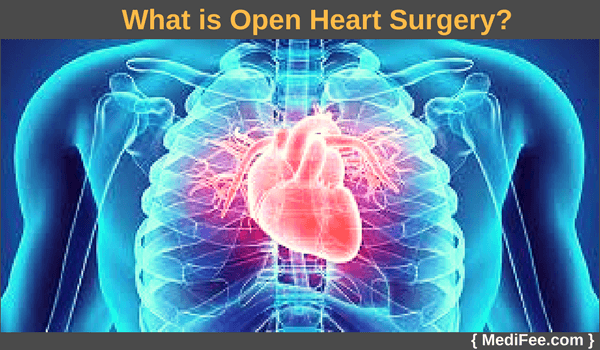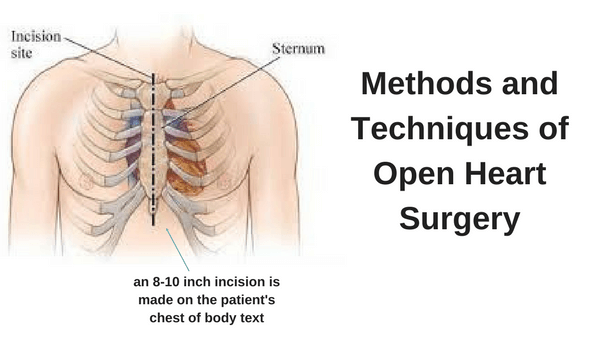Open Heart Surgery
Listed below is the step by step procedure of open heart surgery:
- What is Open Heart Surgery?
- Why is Open Heart Surgery Required?
- Pre-operative Preparations
- Day Before Surgery
- Procedure Day
- Methods/Techniques of Open Heart Surgery
- Post Procedure
- Risks and Complications
What is Open Heart Surgery?
Open heart surgery is a surgical approach used by cardiologists for treating different cardiac conditions. It is used in a number of surgeries pertaining to heart such as atrial septal defect, ventricular septal defect, coronary artery bypass grafting (CABG), heart valve replacement surgeries etc.

Why is Open Heart Surgery Required?
Open-heart surgery is done for following reasons:
- Repair or replace heart valves: Open heart surgeries can repair or replace heart valves which have become dysfunctional which results in an obstructed blood flow to and from the heart.
- Repair blockages: Blockages occur in heart because of deposition of plaque which is cholesterol. These blockages obstruct flow of blood to the heart and so an open heart surgery becomes a necessity.
- Repair damaged or abnormal areas: of the heart
- Device implant: Open heart surgery is also used for implanting medical devices in people who have arrhythmia which is irregular heartbeats. Device implants regulate the heart beats.
- Heart transplantation: Open heart surgeries are helpful in performing heart transplant in a person who has a damaged one with that obtained from a donor.
Pre-operative Preparation
The patient is supposed to undergo few tests before the actual surgery day. Few of them are as follows:
- Blood tests: Blood tests are essential to help the doctor know your physical well-being.
- Chest X-ray: This gives the surgeon an idea of how well the heart is functioning or is it not functioning.
- Electrocardiogram: Damage to heart muscle can be known through electrocardiogram results.
- Anesthetic evaluation: Anesthetic evaluation is necessary for the doctor to know whether the anesthetics they use on surgery day suit you or not.
Day Before Surgery
- You need to inform the doctor about every medicine you are taking and any disorder you suffered from in recent past.
- The doctor may also ask you to stop taking any blood-thinning medication you might be taking for any illness.
- You may also get instructed by your doctor to quit smoking and drinking 2-3 weeks prior to the surgery.
- After midnight, on the day before surgery, you may get instructed to not eat or drink anything.
- You may be given an antiseptic soap for bathing on the same day.
Procedure Day
- Vital signs, weight and the tubes like drains and catheters that will be attached to your body are monitored.
- A tube (for helping you to breath when you are asleep during surgery) is attached to your body that is connected to a breathing machine.
Methods/Techniques of Open Heart Surgery
The procedure commences with general anesthesia rendering the patient unconscious. An 8-10 inch incision is made on the patient's chest. Another cut needs to made across breastbone of the patient for the heart to become clearer to the operating surgeon. A heart-lung bypass machine is connected to the patient's body thereafter. The machine stops the heart from beating so that the surgeon can operate on it.

A machine simultaneously takes down blood from the heart which oxygenates the blood and puts it back into the body. A wire is placed in the breastbone and the original incision is stitched up. Open heart surgery is also possible without stopping the functioning of heart. That approach is termed as “off pump.â€
Post Procedure
- You will be shifted to a hospital ICU after surgery is done. Few tubes are attached to your chest. One of them facilitates fluid drainage from adjacent area of heart. The other is an intravenous line that works for supplying liquids and medication. An attached catheter drains out urine from your bladder.
- Your heart will be continuously monitored through machine attached to your heart.
- Once your health shows progress, you will be shifted to a hospital room; preferably in 5-7 days.
Do's and Don'ts Post Open Heart Surgery
Open heart surgery is a widely performed procedure. The patient needs to follow a set of precautionary measures in order to have a speedy recovery which is gradual and does not happen in the blink of an eye:
- Incisional care
It is essential that the patient keeps the incision area clean and dry. Use soap and running water to clean it. Call the doctor as soon as possible if you see redness and discharge from the incision.
- Diet
Not feeling like eating anything in the days after surgery is normal. However, try eating food in small quantities. Discuss it with your doctor if the lack of appetite does not disperse in few weeks time. Prefer cooking food in vegetable oil rather than butter.
- Driving
Ask the doctor as to when you can resume driving.
- Strenuous activities
Avoid pushing and pulling heavy objects around the house. Try to walk around and be active. Try to gradually resume the tasks and work you did in the life before surgery.
- Bathing
Use warm and not very hot water for bathing. Water that is very hot will make you feel dizzy.
- Sleeping patterns
Try not to remain in bed for longer time periods. Also, avoid beverages like sodas, coffee and tea in the 2-3 hours before bed-time. Limit your alcohol intake, especially when medications are on.
- Walking
Walking is essential to reduce stiffness from your muscles, improve the blood circulation in your body and also make you get rid of depression.
- Smoking
It is important to continue the habit of staying away from the cigarette for the time after surgery.
Risks and Complications
Open heart surgery is a major cardiac procedure. Obviously like any other surgery, open heart surgery also carries few complications which are as mentioned below:
- Swelling: Swelling in feet because of incisions made in the leg for grafting purposes is common.
- Loss of appetite: There is a decreased sense of appetite and taste for few weeks following the surgery which is natural and not a major complication.
- Nausea: Feeling repelled from food after merely smelling or seeing it is common and will go away on its own.
- Difficulty in sleeping: Losing sleep after the surgery is common. Having disturbed sleep and waking up in between multiple times is also common and nothing to worry of.
- Constipation: Constipation and an affected digestive system are by-products of surgery. Consuming a high-fiber diet helps to dissipate constipation.
- Mood swings: Mood swings and unstable temperament post surgery is natural too.
- Lump at top of incision: Lump formation at site of incision and subsequent infection is a possibility too.
- Clicking noise: A feeling of hearing a clicking sound from your chest after surgery is possible. That goes away on its own, if not, you need to contact your doctor.
- Heart rhythm problems: Irregular heartbeats that are termed as arrhythmia are a possibility in people undergoing open heart surgery for any of their cardiac issues.
- Anemia: People undergoing open heart surgery are likely to have blood counts that don’t return back to normal. That leads to fatigue and tiredness in a short time or even after slightest efforts.
More information related to Heart Surgeries
- Information on ASD (Atrial Septal Defect) Surgery
- Information on Ventricular Septal Defect (VSD) Surgery
- Information on Heart Valve Replacement Surgery
List of best Cardiac Surgeons in India and top cities
List of best Cardiothoracic and Vascular Surgeons in India and top cities
List of best Cardiology Hospitals in India and top cities

